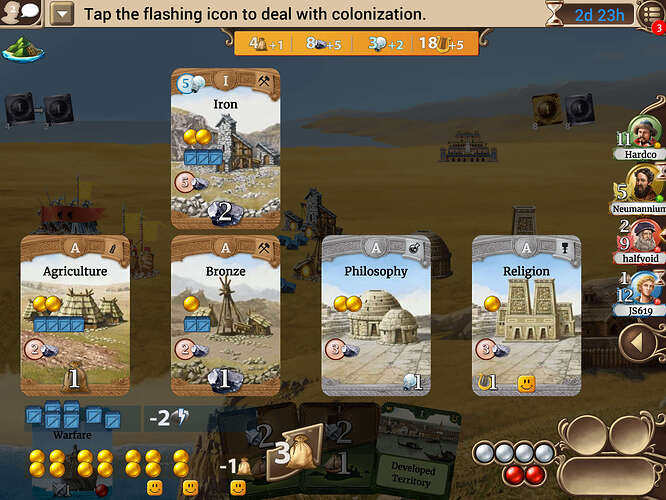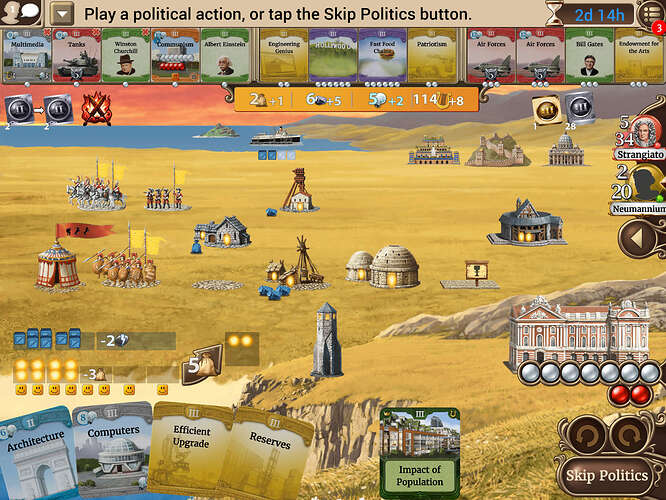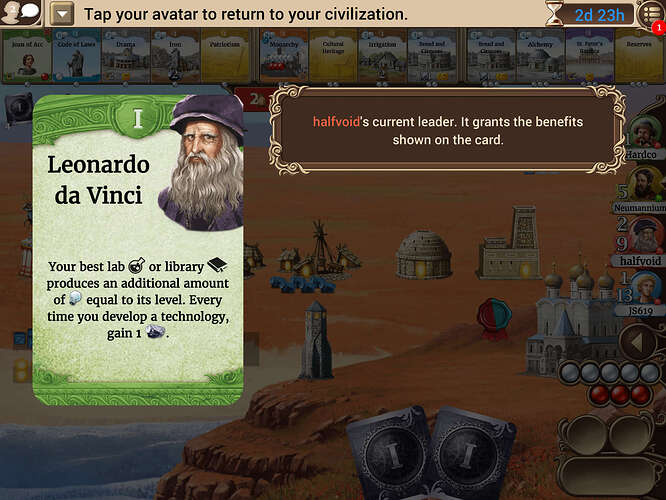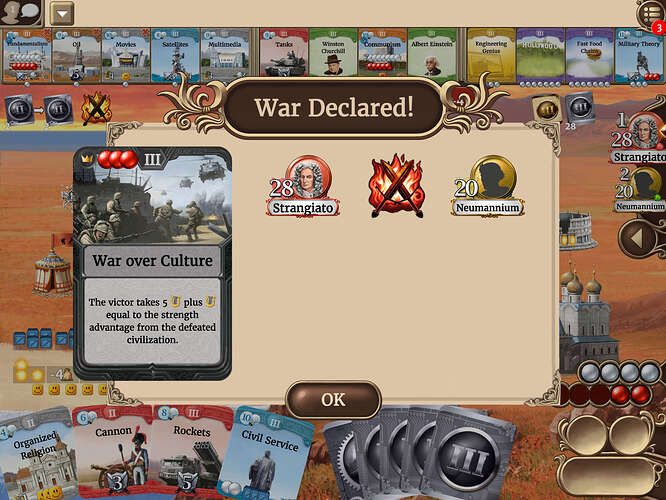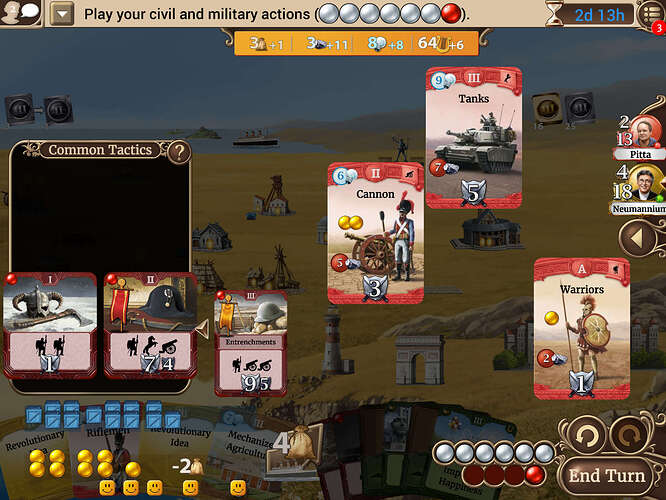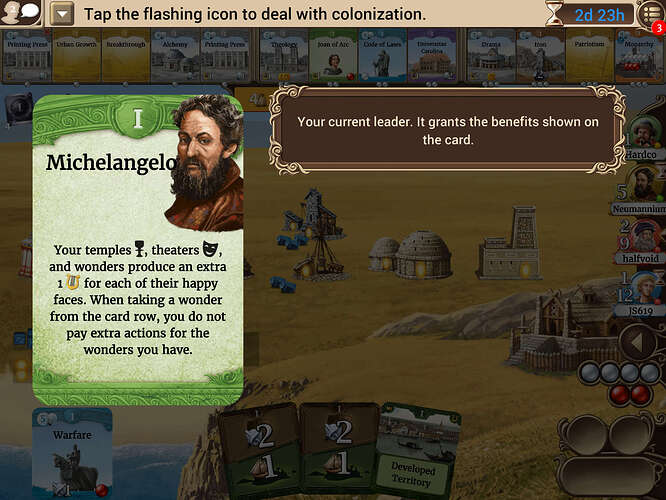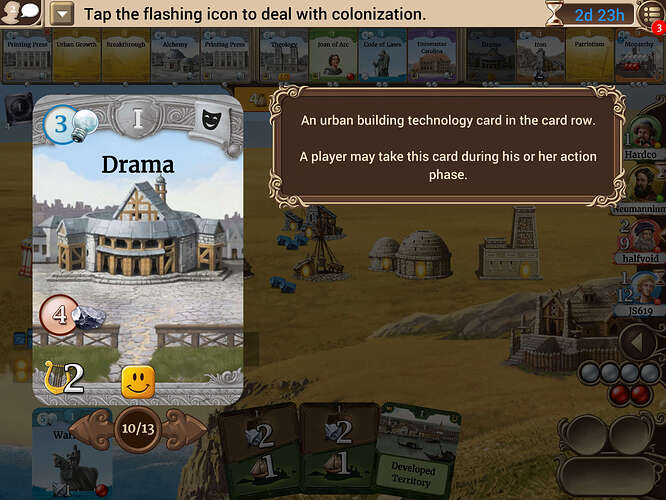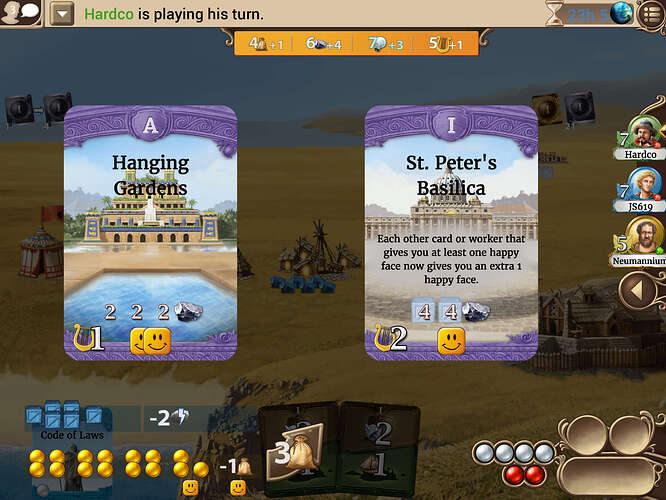Originally published at: http://statelyplay.com/2017/09/25/strategy-101-through-the-ages-resource-edition/
iOS Universal, Android •
I’m pretty sure I’ve stated my incompetence when it comes to winning games of Vlaada Chvátil’s masterpiece, Through the Ages. Now that it’s out on the App Store, many of you have been witness to said incompetence. For those who have yet to see it, t’s truly a wonder to behold. While I may suck at TtA, I have played the game, hundreds of times, actually. While my win percentage doesn’t back up that claim, I attribute my woeful performance far more to my adult ADD and less to understanding how the game operates. I cannot resist building a Wonder, even if everything in my current “strategy” screams against it. I like shiny things.
While Through the Ages can seem complex, the rules are actually rather simple. The complexity comes from trying to juggle all of TtA’s parts so they work together. Let’s take a look at how this thing ticks.
The core of Through the Ages is resource management. There are five major and one minor resource you need to worry about from the dawn of antiquity until that final turn of Age IV. Falling behind in any of them can mean the difference between winning and ending up like me. Don’t be like me.
Let’s take a look at each of the resources and how to keep each in the black.
Ore
While all the resources are important, I tend to find myself short of ore more than any other, and not being able to build is a killer.Ore is primarily gained through a group of structures called Mines. You begin the game with two bronze Mines which will provide you 2 ore each turn, one for each mine. Your first full turn should always consist of adding a third bronze mine so you can bump up your ore income to 3 per turn. Age A buildings such as Philosophy, Religion, and Warriors can all be purchased for three ore. If you want to build any other buildings, however, three ore isn’t going to cut it.
[caption id=“attachment_3124” align=“aligncenter” width=“2048”]
Did I leave the Iron on?[/caption]The easiest, and most efficient way to bump up ore production is by upgrading your mines. If an Iron card comes out early in Age I, I always try and grab it. It might take several turns to build and upgrade your mines to Iron, but the Age A events are usually helpful in providing some extra science or ore to help you along. Going from 3 to 6 ore is a godsend early in the game and will open up the ability to build any Age I urban buildings your civilization desires.
If Iron seems to be buried in the Age I deck and doesn’t make it to the card row until late in Age I, I tend to skip it and wait for Coal to show up in Age II. There’s no reason to research both Iron and Coal, so pick whichever you’re going to focus on and stick with it. If you’re waiting for Coal, you’re going to run into a few problems. First of all, you’ll be stuck with Bronze mines for a long time. If I get Iron out early, I usually stick with only three mines until later in the game when actions are more plentiful. If it looks like Coal is the way to go, I’ll usually build a fourth Bronze mine early. I’ll also be a hawk for any of the yellow Action cards that mitigate my weak ore production. The best Action cards for this are Urban Growth, Rich Land, and Efficient Upgrade. These allow you to build or upgrade your mines, farms, or buildings on the cheap without costing an extra precious Civil Action (other than the one you used to take the card from the card row…you only spent one, right?). Reserves gives you a healthy amount of ore, but will cost you an extra action just to play the card. Not ideal, but if you’ve managed to secure a healthy number of Civil Actions via your government or blue technology cards, then it’s not a bad way to supplement your meager ore income. Engineering Genius is another Action card that doesn’t cost an extra action to play and can save you a ton or ore, but is only useful if you plan on building wonders. We’ll talk more about which wonders are worth their weight in ore in another column, but for now Engineering Genius cards are useful only if you’re in the Wonder business (which you probably shouldn’t be if your ore income is on the low side).
By the time Age III rolls around, you have to start thinking about Oil. Having 3-4 Oil wells in the late game is kind of like being a member of the 1%. Money, or in this case ore, is no object. You can afford anything and everything in the game, often able to grab and construct a Wonder in one turn. It’s glorious, but also expensive. Do you need 3-4 Oil wells? Probably not, and you’ll usually be okay with 1-2, saving the rest of that ore for a rainy day.
Having seemingly unlimited ore is pretty great, though. How else can we get there? Look no further than our bespectacled friend, Bill Gates. Mr. Gates turns your Science labs into ore producing machines, and also scores you points at game’s end for each ore it produces in a turn. Bill’s a great Age III leader, especially if Oil doesn’t hit the card row until late or if you’d rather focus on generating culture instead of upgrading all those mines.
Food
I struggle with food, both in real life and in Through the Ages. In real life, I have far too much of it and in Through the Ages I tend to never produce enough. It's the forgotten resource because you can usually get by with very little, especially in the early and mid-game, but having a rich food income each turn can mean the difference between building another movie theater or throwing away Civil Actions because you can't feed your population.You begin with 2 Agriculture workers, which is enough in the early stages of the game. Unlike Iron when it comes to ore production, pick up Irrigation even if it comes out late in Age I. Updating to 2 Irrigation Farms, generating four food each turn, should be enough for your civilization through Age II when you’ll want to look at increasing food production. Unlike ore, simply adding one or two more Irrigation farms might be good enough to keep your civilization rolling, and it will probably be cheaper than upgrading to a higher level farm. That said, it’s also less efficient, meaning you’ll be tying up those precious blue cubes on turns when you don’t need or want to build and workers.
[caption id=“attachment_3125” align=“aligncenter” width=“2048”]
Quite the philanthropist.[/caption]I’ll be honest, food is always an issue and I usually deal with it on the fly, upgrading or building more when it starts to become a problem. There aren’t as many good Action cards to help with food woes, so you should look at fixing your food generation with new farms rather than the quick fix of a Reserve card.
One great way to supplement your food issue is the Ocean Liner Wonder. This wonder allows you to generate one worker for free each turn, which is often more than each turn needs. If you’re able to get and build Ocean Liner, feel free to leave those farms as dilapidated as you like. It is an expensive Wonder, however, so only count on it helping you if you have healthy ore production.
Science
While you'll often have turns short of ore or food, Science is the resource that I find the hardest to maintain. Unlike the higher level buildings which can be upgraded from lower levels, only paying the difference, you're always paying the full Science cost for each technology you discover. You're hand will be clogged with many technologies that are only waiting for enough Science to make it happen, but you're cursed with the knowledge that once you spend all your Science on one card, you'll have to wait several turns to build up enough Science to play another. There's nothing more frustrating than watching your enemies prepare for an Aggression, and all your military technologies are in your hand rather than on the board.Science is generated via two buildings: Libraries and Labs. You begin the game with one Lab, Philosophy, generating one meager Science each turn. Considering that technologies in Age III can cost up to 17 Science, one per turn isn’t going to get the job done, so let’s get building!
[caption id=“attachment_3126” align=“aligncenter” width=“2048”]
Yes, it’s Age III and I’m generating 2 science. Shut up.[/caption]Unlike ore and food, where you can mitigate low incomes until a bit later in the game, more Science is always a good thing. I will always try to get Alchemy in Age I and will then still pick up Scientific Method in Age II if its available and I have other issues that require immediate attention. I’ll even pick up Computers in Age III, trying to make sure I’m generating the most Science I can each turn.
Leaders help out quite a bit here, with one Leader each age helping your Science output. On the down side, they don’t help much else, so if you really need a Leader who can help you in another area of the game, the tech-focused Leaders might not be your bag. We’ll look at Leaders in depth in a future column, but here are how the tech-heavy Leaders shake out.
Starting in Age A, I will gladly pick Aristotle. His ability to grant you one Science point every time you take a tech card from the card row is fantastic. Most of the Age I tech cards have a low Science cost, so his additional bump might be just what you needed to push you over the hump.
Leonardo in Age II is less useful, granting you an extra science based on the level of the lab. You’re most likely to have Age I labs when you pick him up, so getting that extra 1 or 2 science isn’t that great. His secondary power of one ore when you discover a tech is too little of a reward for the small bump in Science.
Newton in Age II, however, is a different story. Not only does he give you the bump from your Labs, but you also get one Civil Action whenever you discover a new tech. You basically get to discover technologies for zero Actions which, if played right, can be a huge boon, allowing you to do all sorts of other things that you normally wouldn’t be able to get done in a single turn.
When it comes to Age III Leaders, I hope your civ is pooping out enough Science by this point to avoid picking any of them to supplement your Science income. In fact, instead of bumping up your Science, you may want to stunt your production instead. Consider Sid Meier. If you’re Science is high enough, you can handle the hit he gives to your production and the extra Culture he produces can be huge, especially if you have Computers in play. There’s always Bill Gates, too, who will turn those labs into ore making machines. I will usually try to get either Bill or Sid on my team in Age III unless I desperately need help in another area (I usually do).
[caption id=“attachment_3127” align=“aligncenter” width=“2048”]
Despite my feelings, Leo remains a popular Leader pick in Age I. Maybe I’m wrong? No, couldn’t be.[/caption]There are also Libraries, which offer less Science than Labs, but also offer a bit of Culture, which just happens to be what you need to win. Due to their diminished Science output, Libraries are really only helpful if built alongside Labs. Do you have enough Actions and ore to build an entirely new type of building? I often don’t, so Libraries remain in the Card Row. If I do build Labs and Libraries, however, I will try to snag Shakespeare as my Age II leader, as the boost you’ll get in Culture is worth the extra time and money you’re dumping into the Library tree.
Science can also be supplemented with Wonders, but there isn’t one specific Wonder that will give your Science production a big enough boost to rely on. In general, I will ignore the Age A Science Wonder, Library of Alexandria. The +1 Culture and Science just isn’t worth it, especially compared to other Age A Wonders. Universitas Carolina, the Age II Wonder, can be worth the effort. Its +2 Science is equivalent of another Alchemy Lab, which is quite a boon in the early game when you’re usually limited to only two buildings of the same type by Despotism.
Military Strength
Ah, military. The bane of my existence. If, like me, you revel in the building up of your civilization, then Military will be easy to forget. Ignoring Military will quickly lead to your downfall as both humans and AI players will happily pounce on a weakling and repeated Aggressions and Wars can destroy any chance you have of winning.[caption id=“attachment_3128” align=“aligncenter” width=“2048”]
What’s it good for? Absolutely nothing.[/caption]Military is a fairly basic concept in TtA. Each troop type (Infantry, Cavalry, Artillery, Air Force) can be built like any other building, with each giving you a bit of Military Strength. Like buildings, the benefit increases for each unit type each Age. Unlike the other resources in TtA, however, your reliance on Military is completely dependent on your opponents. If your opponents are content to live with Age A’s Warriors the entire game, there’s no need for you to build Tanks. You can live a completely happy existence with a band of Warriors at your side as well.
If, however, they build Riflemen and Cannons and you’re still stuck with Warriors, we have a problem. The most basic goal with Military is to stay within a hair’s breadth of your opponents. You don’t have to be in the lead, but you don’t want to be in last place, either. Many events are beneficial for the strongest civilizations and harmful for the weak. Striving to be in the top two all the time is hard, so the bare minimum is simply not being at the bottom of the Military leaderboard.
Of course, this all goes out the window if you want to be a Warmonger. Military can be used to supplement your ore, food, science, and culture income through Wars and Aggressions. You can dump a lot of resources into your Military and be the biggest bully on the block and it might work out for you. What usually happens, however, is your opponents will do whatever they can to stay close to your Military Strength creating a Mutually Assured Destruction situation where no one can attack the other, but everyone will have a ton of resources invested in their Military budget. This isn’t the worst thing, as you can easily pounce on someone who lags behind or, more likely, decimates their military to claim a Colony. I, however, prefer to simply keep pace with my Military and focus my resources elsewhere. Did I mention that I usually lose? There may be a correlation…
[caption id=“attachment_3129” align=“aligncenter” width=“2048”]
Spears and tanks together. That’s some brilliant military planning right there.[/caption]There are many other ways to supplement your military if you don’t want to focus solely on pumping out new units. There are several blue technology cards that not only bump up your Military Strength, but also provide you extra bonuses like Military Actions or Colonization Bonuses. These cards are great even for peaceniks, and should be discovered if your Science will allow it.
There are also Military Wonders that can bump up your Strength, often with other benefits as well. I love the Great Wall, as it lets me focus on Infantry without having to discover other Military types, and also gives a little bit of Happiness. Transcontinental Railroad is also a useful Wonder, but only if you’re in the Coal or Oil business. The benefit to your mines if you’re stuck in Iron isn’t worth the payoff, although the +5 to your Military Strength is a very nice boost.
As for Military Leaders, I usually skip the Age A Military Leaders and go right to Age I. Genghis Khan is our man, allowing us to use Infantry as Cavalry when it comes to Tactics. Oh, wait, we haven’t talked about Tactics, which are the most important part of a healthy military. Tactics allow you you sort your Military units into Armies providing a boost to your Military Strength. Always, always, always, pick a Tactic card and strive to fulfill its requirements. Don’t pick one that you know you won’t build (I will often ignore Tactics that include Cannons, for example, because I don’t want to be forced to build a new type of unit if I don’t have to). The early Tactics cards will usually suffice until mid-game, unless you have a warmonger on hand. If so, pick up Khan, as he’ll open up a world of new Tactics without having to spend the Science to invest in Cavalry units. Just be ready when Age III begins, because that’s when Khan dies and your Military Strength will plummet. Try to shore up your Military before Age III begins, and replace Khan with a different leader before he starts pushing up the daisies. Someone like Napoleon might help, giving you a +2 for every type of unit you possess.
There are also Arenas, which boost not only your Strength but your Happiness as well. Stay away from Arenas unless you’re focusing on Military and need the help generating Happiness.
Culture
This is the big one. This is the only resource you need to win the game, and is often the most neglected. Culture does nothing for you in-game, so it's easy to ignore in favor of a shiny new Wonder, Lab, or Military Unit. Problem is, if you fall too far behind in the mid-game, it's nearly impossible to come back and overcome a player with an efficient Culture engine.[caption id=“attachment_3130” align=“aligncenter” width=“2048”]
The coolest of all the ninja turtles.[/caption]Culture is obtained with buildings, Wonders, Leaders, Events, and more so it seems hard to ignore, but it’s actually quite simple. Building a strong Culture engine requires combining all these things together to crank out as much Culture as you can, even if it’s only for a short time. If you rely solely on Theaters to provide your culture, your opponents will run away with the game. If, instead, you build Theaters coupled with a Leader that boosts your Theater output, now you’re onto something. Even better, find a Wonder or Library that bumps it up even further, pushing Culture into the coveted 15+/turn range.
If you can make it work, Michelangelo is a Culture god. He gives you Culture for every Happy Face generated on your Wonders, Temples, and Theaters. If you can grab Hanging Gardens in Age A, you’re starting on a good Michelangelo path. Supplement that with St. Peter’s, a Theater or Temple or two, and Michelangelo will push you into a level of Culture that most players won’t start generating until later in Age III.
Another good way to go is the Shakespeare/Library/Lab combo. This requires you to have a good food/ore engine so you can create and upgrade Theaters and Libraries, but if you can max out those buildings with Shakespeare in tow, even opponents with Michelangelo will start to get a little worried.
Other Leaders are helpful as well. Bach will make your Theaters cheaper, and cause them to create even more culture. We already talked about Sid Meier who is a great choice for the more Scientifically minded, turning your Science into Culture in the game’s late stage.
The problem, of course, is all these culture producing combos don’t do much else for your civilization. None of these will give you more ore, food, Science, or Military, so focusing on these Culture-centric cards will often lead to devastating shortages in other areas of the game. If you plan on grabbing Michelangelo and the wonders and buildings that make him powerful, realize you may only get his benefits for a few turns before you need to cut him loose and focus on another part of your civ. That’s not the worst thing, after all if he can generate 15+ culture over only 2-3 turns, that’s still a heaping spoonful of Culture that your opponents will be hard-pressed to make up. Be aware, however, that if your Culture shoots far ahead of your enemy’s, they may feel forced to push their Military to the limit to take advantage of Age III’s many War Over Culture cards, and try to steal as much of your Culture as they can. Don’t go all in on Michelangelo if you can’t keep up with the Joneses in Military, or you just might be generating all that Culture for your opponents in the long run.
[caption id=“attachment_3131” align=“aligncenter” width=“2048”]
A familiar topic for parents of teens.[/caption]There are also some great Wonders that will really boost Culture if you can get them built early enough for their culture output to trigger multiple times. Eiffel Tower and Taj Mahal both give you a nice Culture boost if built early, and then there are the Age III Wonders which can provide 20+ culture in a single turn. This is why you want that strong ore engine for the endgame. Pick up Age III Wonders and build them in a turn or two, which is even easier if you have one of the Architecture technologies, allowing you to build several stages of a Wonder with only one Civil Action.
Happiness
Happiness is the minor resource I spoke of nearly 3500 words ago. It's minor in its acquisition, not in importance. If you ignore Happiness, all that ore and food is nearly worthless. Luckily, getting Happiness isn't too tough. It's a side effect of many different building types and, if you do it right, you shouldn't have to think about it at all during the game.First and foremost, try to get Hanging Gardens in Age A. The two Happy faces it provides will allow you to ignore both Religion and Arenas in the early game, allowing you to focus your precious ore on other matters. By the time its two Happy faces aren’t enough for your civilization, you should have some Theaters built, which will provide all the happiness you need for the rest of the game.
[caption id=“attachment_3132” align=“aligncenter” width=“2048”]
Oh, Michelangelo, where are you?[/caption]I generally only build Temples if I missed out on Hanging Gardens or am having issues with Happiness due to other issues (other players taking Theater techs from card row, low on Science/food/ore so pricey Theaters are hard to build, or I just suck), or if I’m aiming for a Michelangelo strategy. Otherwise, the 1 Culture you get from even the higher level Religion buildings isn’t worth it.
Instead of Temples, I will usually aim for Arenas if my Happiness is low. I find the combination of Happiness and Military to be a much healthy combination than the meager Culture/Happiness combo Temples provide.
Wonders are a great way to boost Happiness as well. I’ve already mentioned the Hanging Gardens and Great Wall, but St. Peter’s Basilica is really the top of the line. If you can build both Hanging Gardens and St. Peter’s, your Happiness worries are over.
Thanks for listening to me ramble. Not sure if this is helpful or not, but it was fun to write. Let me know in the comments if it was worth the effort and I will continue the series by looking at Leaders and Wonders next. Or tell me to pound sand and I’ll start looking at strategy for a game I don’t suck at. Sure, it will take me a while to find one of those, but there has to be at least one out there.
https://youtu.be/miKmbmXm9VU
